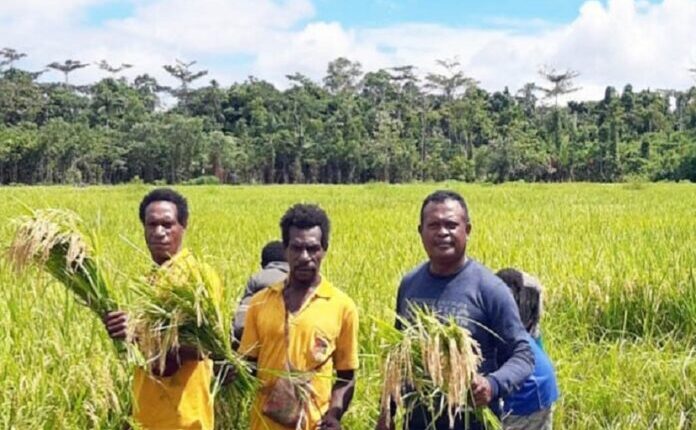By: Yohana Tebay)*
Papua, as one of the provinces in Indonesia which is rich in natural resources and cultural diversity, requires attention and collaborative efforts from various parties to realize sustainable and inclusive development. In this context, collaboration between religious leaders and community organizations (ormas) has a very important role in raising the potential and supporting the development of Papua.
Collaboration between religious leaders and community organizations (Ormas) is the key to raising potential and accelerating development in Papua. In various events, such as the XIV Ecclesiastical Choir Festival (Pesparawi) throughout Tanah Papua, important figures and regional leaders emphasized the importance of a spirit of togetherness and brotherhood. This spirit not only strengthens faith and unity among Christians, but also encourages cross-sector collaboration to create an inclusive and sustainable development ecosystem.
The Director General of Christian Community Guidance at the Ministry of Religion of the Republic of Indonesia, Jeane Marie Tulung, while attending the closing ceremony of Pesparawi XIV must be used as capital to build a peaceful, prosperous and prosperous Land of Papua through increasing tolerance and unity between religious communities.
Jeane Marie strongly supports this ecclesiastical activity as a forum for witnessing God’s glory through the singing of beautiful and meaningful spiritual songs. It is hoped that this activity can strengthen faith and strengthen brotherhood to build the Land of Papua for the better in the future and must become capital for the spirit of togetherness to develop Papua.
This spirit of unity and brotherhood is an important capital for building a peaceful, prosperous and prosperous Land of Papua. The government also hopes that Christians will maintain national unity with an attitude of mutual respect and respect for differences to work together to maintain peace and tolerance in the Land of Papua.
The Acting (Pj) Governor of West Papua Province, Ali Baham Temongmere, expressed his appreciation to the committee for holding this Pesparawi. During the ecclesiastical event, the party witnessed various interesting performances and deserved appreciation. The momentum of Pesparawi
Meanwhile, the General Chair of the Indonesian Chamber of Commerce and Industry (Kadin), Arsjad Rasjid, said that the development of the creative economy in West Papua Province requires collaboration between the regional government and the private sector. It can’t just be the government itself, but needs support from the private sector so that together they can move the wheels of the economy.
According to him, regional governments as policy makers have an important role in formulating regulations in creating an inclusive and conducive business ecosystem for all business actors in West Papua. An inclusive business ecosystem is not only profit-oriented, but has a positive impact on the social conditions of society which is relevant to the government’s efforts to accelerate welfare development. The partnership between the government and the business world is an important factor in accelerating the economic development program in West Papua which prioritizes the principle of justice.
The Acting Regional Secretary (Sekda) for West Papua, Yacob Fonataba, admitted that the capacity of the provincial APBD after the expansion of the new autonomous region of Southwest Papua experienced a very significant decline. Therefore, regional governments need support and an active role from the private sector in optimizing the development of economic potential in the agricultural, forestry, maritime and fisheries sectors, including MSMEs.
In his speech, the Acting Governor of Central Papua, represented by Assistant I for Government and People’s Welfare, Ausilius You, hoped that mass organizations could help development in the region, both in short, medium and long term development planning and as development participants through proposals and work. done.
According to Ausilius, mass organizations are an important element in national and state life. For this reason, it is hoped that it can preserve and maintain norms, ethics, as well as maintain and strengthen national unity and integrity within the framework of the Unitary State of the Republic of Indonesia (NKRI). It is important to ensure that activities do not deviate, with the need for strict supervision to prevent the emergence of mass organizations that go astray.
Religious figures and mass organizations are always present and make major contributions to development and maintaining the sovereignty of the nation and state. The development of the large number of mass organizations must of course be balanced with an increase in the role and function of mass organizations in development. In facing challenges and threats from within, mass organizations have an important role in minimizing the impact of problems and potential individual movements that disrupt national stability.
Mass organizations are required to continue to improve the quality of institutions, including administration, members and human resources, as well as activity programs. They are also expected to provide control and input to the government, by establishing two-way communication between mass organizations, central government and regional governments to convey aspirations for regional development.
)* The author is a Papuan student living in Makassar
